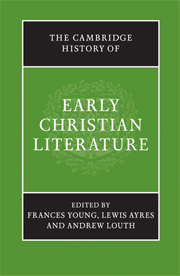Book contents
- Frontmatter
- PART ONE The Beginnings: The New Testament to Irenaeus
- PART TWO THE THIRD CENTURY
- PART THREE FOUNDATION OF A NEW CULTURE: FROM DIOCLETIAN TO CYRIL
- A LITERARY GUIDE
- B CONTEXT AND INTERPRETATION
- 37 Social and historical setting
- 38 Articulating identity
- 39 Christian teaching
- 40 Retrospect: interpretation and appropriation
- Bibliographies
- Index
- Map: The Roman Empire in the late fourth century AD"
- References
40 - Retrospect: interpretation and appropriation
from B - CONTEXT AND INTERPRETATION
Published online by Cambridge University Press: 28 March 2008
- Frontmatter
- PART ONE The Beginnings: The New Testament to Irenaeus
- PART TWO THE THIRD CENTURY
- PART THREE FOUNDATION OF A NEW CULTURE: FROM DIOCLETIAN TO CYRIL
- A LITERARY GUIDE
- B CONTEXT AND INTERPRETATION
- 37 Social and historical setting
- 38 Articulating identity
- 39 Christian teaching
- 40 Retrospect: interpretation and appropriation
- Bibliographies
- Index
- Map: The Roman Empire in the late fourth century AD"
- References
Summary
In the eighteenth century, John Wesley took up the study of ancient Christian literature in Oxford. The last half of the seventeenth century had seen a revival of patristic interest and the production of new editions made the texts available. It is said that ‘in the thought and piety of the early Church [Wesley] discovered what he thereafter regarded as the normative pattern of catholic Christianity’. According to his Journal, Wesley daily checked his reading of Scripture against the early authors as he crossed the Atlantic to America. In his Address to the Clergy of 1796, he said:
Can any who spend several years in those seats of learning [the universities] be excused if they do not add to that of the languages and sciences, the knowledge of the fathers - the most authentic commentators on Scripture, as being both nearest the fountain and eminently endued with that Spirit by whom ‘all scripture was given’? … I speak chiefly of those who wrote before the Council of Nicaea. But who would not likewise desire to have some acquaintance with those that followed them - with St. Chrysostom, Basil, Jerome, Austin, and, above all, the man of a broken heart, Ephraim Syrus?
Wesley provides a clear example of how the Fathers have been valued, particularly as providing a hermeneutic of Scripture. The Reformation did not immediately occasion a devaluation of the Fathers, despite the watchword sola scriptura. Eastern theology has always affirmed that all theology is in the Fathers, thus implying that theology is simply exegetical of the patristic material; and Western theology, though somewhat less explicit, has in practice accepted that the doctrinal orthodoxy defined in the patristic texts provides the criteria by which essays in systematic theology are to be judged.
Keywords
- Type
- Chapter
- Information
- The Cambridge History of Early Christian Literature , pp. 485 - 494Publisher: Cambridge University PressPrint publication year: 2004
References
- 1
- Cited by

